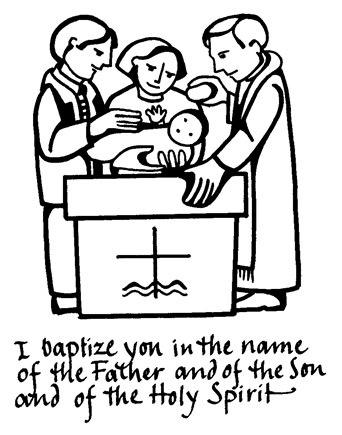What is Episcopal Christianity?
In our Course of Study, we will focus on living life as an Episcopal Christian as a Way:
- A Way of Seeing
- A way of Hearing
- A Way of Teaching
- A Way of Following
A Way of Seeing
The central visual symbol in almost every Episcopal Nave (Sanctuary or worship space) is the cross, the cruel instrument of torture and death which the Roman Empire reserved for rebellious slaves, violent criminals, and threatening political subversives. (Look around the creator Nave and count the number of crosses you can find).
This symbol is central because we confess, “It is here, on the cross, that God meets us.” Here God makes himself present …
- Hidden in weakness
- Vulnerable
- Suffering
- Forsaken
- Dying
In the abyss of despair, in the deepest darkness God comes. In the painful reality of our mortality, our ultimate loneliness, our weakness, God encounters us. As we view the cross, all our human attempts to find God are exposed as illusions.
We do not find God by …
- Proving his existence by the wonder of nature or the power of logic.
- Validating his presence by visible blessings.
- Having a prescribed religious experience.
- Earning divine love by our good works.
- Building glorious religious institutions.
- Reaching a high level of personal morality.
- Saving ourselves through status, wealth, knowledge, consumption, chemicals, positive thinking, correct religious doctrine, health foods, or exercise plans.
We do not find God. God finds us—in our darkness, our pain, our emptiness, our loneliness, our weakness.
 The Cross is God’s Embrace
The Cross is God’s Embrace
God enters our darkness and embraces us with total and unconditional acceptance. Identifying completely with the pain and sorrow of our existence, God woos us into a love relationship with himself.
 The Cross is God’s Victory
The Cross is God’s Victory
God enters and exposes and defeats the powers that reign in this world. By the death of Jesus, God liberates us from the fear of any person, thing, system, or “ism” which would enslave us by demanding absolute loyalty. We are free! Free to let God be God. Free to be fully human.
We see! WE celebrate! The creator of the universe is a risk-taking, prodigal, extravagant, passionate, merciful, mothering, and fathering God who enfleshed himself in Jesus. The Holy Spirit opens our eyes to see and to understand the deepest of mysteries.
God does not despise flesh,* He
Dwelled in the flesh of Jesus and
He dwells in flesh today. The ruler
Of the universe hides himself in the
Common, in the stuff of this earth.
God lives in creator; he lives in all.
Therefore, we see God in all …
-
“Flesh in this context refers to the human body—bones, muscles, organs, etc. and, in a wider sense, the material world. The goodness of matter is affirmed in Genesis 1 and, above all, in the birth of Jesus as God in flesh. When Paul talks about “flesh” in romans8, he is not talking about matter but a will that is directed away from God. We need to understand the difference between these two uses of ‘flesh” in order to avoid the unbiblical idea that matter is evil
Blessed are the Pure of Heart for they shall see God.” … Everywhere
.

in the home in violence in the prison in the broken home
in the forest in the factory in the sunshine in the air
in a child’s face in the culture in the hospital in the reservation
in the sunset in the poor in the rain in the office
in work worn hands in the sea in commerce in the stranger
in the ghetto in sharing food in government in sexuality
in human love in the dance in the aged in the church
in the enemy in the plains in vocations in the newspaper
in the mountains in the cancer ward in the dying in outer space
in the suburbs in the synagogue in the lab in the temple
in solitude in the mosque in the revolution in the monastery
in the Super Bowl in the opera in death row in the third world
in marriage in the corporation in daily food in death
Yes, Because of Jesus, we see God in all things: Everyone and Everywhere! Weeping where there is pain and alienation, rejoicing where there is wholeness and love. Also, because of Jesus we know that God choses specific parts of his creation where he makes himself know clearly as a God who loves and forgives—as a God who means us well. These special parts of creation are called Sacraments. This week we will study the first of these: Baptism.
Water Flows
…over an infant
…over a child
…over an adult

Episcopalians say Christ is present in the Sacraments (especially in Baptism and Communion) because his is present in all creation. What makes the Sacraments unique is the Promise of God connected to the physical elements and the human action—washing—eating—drinking.
Through water, God touches a weak and vulnerable crown of his creation and says Yes!
 You are incorporated into Christ and into his body, the Church.
You are incorporated into Christ and into his body, the Church.
 You are initiated, adopted into my covenant people.
You are initiated, adopted into my covenant people.
 You are called! Chosen! Saved! Born Again!
You are called! Chosen! Saved! Born Again!
 You are forgiven—free to live without excuses!
You are forgiven—free to live without excuses!
 You are ordained, set aside to be a minister.
You are ordained, set aside to be a minister.
 You are marked with the Cross of Christ forever.
You are marked with the Cross of Christ forever.
 You are given the Gift of the Holy Spirit.
You are given the Gift of the Holy Spirit.
In the waters of Baptism, we died with Christ. We were crucified and buried in order that we might be raised with Christ to live a new life to dwell in a new reality, a new order of existence.
Because of Baptism we Are Christians. Never does our status before God depend on …
- How we feel.
- Having the right experience.
- Being free of doubts.
- What we accomplish.
- Our success or position in the world
We are Christians because God surprised us. Coming in water, God washed us and grafted us into Christ the Tree of Life. Our identity for all the days of our life is set! We are children of God, priests of the King, disciples of Christ, a servant people, a holy nation, the communion of saints, the followers of the Way, proclaimers of the wonderful deeds of God. Jesus’ story becomes our story. Baptized into his death, we are raised to live as the Body of Christ in the world today.
Many Christians were raised with an understanding of Baptism as a preparation for death, an assurance of heaven in the afterlife. Notice that the New Testament understanding of Baptism presented above teaches Baptism as a beginning of a new way of life to be lived in this world.
The Episcopal understanding of Baptism is Radical: i.e., Baptism claims a person for a life of Total Obedience to Jesus Christ. This claim of Baptism is often lost by the misuse of the sacrament—for example, having a baby baptized only because of family tradition or only a naming ceremony. An understanding of the radical nature of Baptism is being recovered by (1) emphasis on pre-Baptism instruction, (2) including teaching about Baptism in preaching and in educational ministry, and (3) inviting persons to renew their Baptism in daily prayer and in renewal ceremonies such as Easter Eve.

Bread is Broken
Wine is Poured
and we share a common meal. The words “This is my body” and “This is my blood” assure us that Christ is present. We believe that Christ is with us as …
-
The Christ of Memory.
-
In the meal the lord’s death is proclaimed. We remember that it was by a body broken and by blood poured out that God chose to save the world. By eating and drinking we participate in that saving event.
-
-
The Christ of the present.
-
In the meal Christ is present. He is Immanuel—God with us, the living word calling us away from lesser loyalties, forgiving our sin, and nourishing us for discipleship. As the host of the meal Christ feeds us with himself so we may be his body in the world.
-
-
The Christ of the future.
- In the meal we are given a foretaste of the feast to come, the great banquet in the coming Kingdom of God. The future breaks into the present. We see a picture of the coming day when all creation will be united under the Lordship of Christ.
- In the meal we are given a foretaste of the feast to come, the great banquet in the coming Kingdom of God. The future breaks into the present. We see a picture of the coming day when all creation will be united under the Lordship of Christ.
We call the meal the Eucharist because we eat and drink in a spirit of thanksgiving (Eucharist means “thanksgiving” in Greek). We are thankful and celebrate the Eucharist as an Easter Resurrection meal. Sunday after Sunday the risen Christ comes to us as God in flesh—hidden in the ordinary food and drink of this world.
 We eat and drink believing. Then believing, we see! If God is in this meal, then God is in all of life. We go forth from the Eucharist celebrating …
We eat and drink believing. Then believing, we see! If God is in this meal, then God is in all of life. We go forth from the Eucharist celebrating …
God Enfleshed
God Involved
God with Us
God in Creation
God with All
God through All
Seeing Jesus as God in the flesh, God entering into our existence to gather us into a Kingdom of wholeness, unity, and peace seeing God in all of creation and specifically in the water of Baptism and the bread and wine of the Eucharist.
